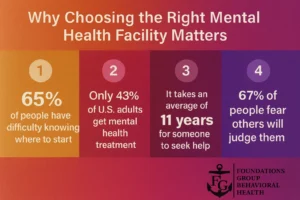You’ve made it here. That means something.
Maybe you’ve tried everything else first—books, podcasts, journaling, distracting yourself. Maybe you’ve told no one, or maybe you’ve told everyone but still feel alone with it.
Either way, something in you knows: I need help.
That moment—when knowing turns into searching—is sacred. It doesn’t need to be loud or dramatic. Sometimes it sounds like, “I can’t keep doing this.” Other times it’s just a quiet, tired, “Please… something has to change.”
If that’s where you are, you’re not alone. And you don’t have to figure it all out today. Let’s start small—by helping you understand how to choose a mental health facility that actually feels right for you.
At Foundations Group Behavioral Health, we offer gentle, professional mental health services in Cape Cod, MA, for people who are finally ready to say, “I need support.” Whether you’re unsure, overwhelmed, or just quietly hoping it won’t be as hard as it sounds—we’re here.
Why Choosing the Right Mental Health Facility Matters
You’re not looking for just any place. You’re looking for the right place—for a provider, a setting, a process that doesn’t make you want to run back into the comfort of coping.
Because once you finally ask for help, the last thing you need is to feel judged, rushed, or talked over.
The “right” mental health facility isn’t about five-star reviews or how fancy the waiting room is. It’s about how you feel inside your body when you talk to someone there. Safe? Nervous but open? Seen?
That’s the stuff that matters.
Step 1: Check If They Honor Where You’re Starting From
When you’re new to treatment, everything can feel unfamiliar. Terms, forms, acronyms, intake calls—it’s easy to feel like you’re already behind.
A good mental health facility knows this.
They’ll take time to explain the basics. They won’t expect you to show up with the “right words.” And they definitely won’t expect you to be ready for everything all at once.
You want a provider who says things like:
- “You don’t have to know exactly what you need—we’ll figure it out together.”
- “It’s okay if you’re not sure how to talk about this yet.”
- “We go at your pace.”
At Foundations, that’s our standard. We meet people where they are, not where a checklist says they should be.
Step 2: Ask About Their Range of Mental Health Services
Mental health isn’t one-size-fits-all. Neither is treatment.
Some people need talk therapy. Some need psychiatric support. Some need structure or group community. Others need a place to start untangling what’s actually going on.
A solid mental health facility offers multiple ways to engage—not just one path with a take-it-or-leave-it approach.
At Foundations, we offer:
- Individual therapy with licensed clinicians
- Psychiatric assessments and medication management (only if desired)
- Group therapy for shared support and skill-building
- Specialized treatment for depression, anxiety, trauma, and more
- A respectful, low-pressure approach to first-time care
We also serve the surrounding Cape area, including Barnstable County and Falmouth, MA, so care is accessible where you live—not hours away.
Step 3: Pay Attention to How You’re Treated, Not Just What They Offer
The truth? You’ll forget the credentials on the wall. What you’ll remember is whether someone made you feel safe.
Choosing a mental health facility is as much about vibe as it is about services. A place can be clinically excellent and still feel emotionally cold. That’s not your fault—and it doesn’t mean therapy isn’t for you. It just means you haven’t found your fit yet.
Ask yourself:
- Did they speak to me like a person, not a case?
- Did I feel pressure to commit before I understood things?
- Was there room for my fear, awkwardness, or questions?
- Did they listen when I shared—even the messy parts?
Facilities that truly center mental health will make space for the whole you—not just your symptoms.
Step 4: Ask About Privacy, Pacing, and the First Session
Most people feel nervous before their first appointment. That’s completely normal. You might be wondering:
- “What if I don’t know what to say?”
- “What if I cry and can’t stop?”
- “What if I’m told my problems aren’t that serious?”
These fears are common—and a good therapist will welcome them without minimizing them.
At Foundations, your first session is about landing. You won’t be expected to unpack everything on Day 1. There’s no pressure to open up faster than feels safe. And we won’t throw technical terms at you without checking that you understand—and agree.
We protect your privacy, respect your emotional pace, and walk you through every step so you’re not doing this alone.
Step 5: Listen for Humanity, Not Perfection
You’re not looking for a hero. You’re looking for a human being who can help you heal.
One of the biggest red flags in mental health care? Providers who talk at you instead of with you. Or ones who act like they’ve got all the answers.
The right mental health facility will leave space for your story. They’ll let you doubt, wrestle, ask questions—and they won’t be thrown off if you’re skeptical or unsure.
They’ll also help you feel something different than you’re used to:
Relief. Hope. Curiosity about your future.
That’s what treatment can be when it’s done well.
You Don’t Have to Have All the Answers to Ask for Help
If you’re wondering whether you belong in therapy, you probably do.
But more than that—you deserve care that sees you as more than a diagnosis. You deserve a place where your pain isn’t measured by how dramatic it sounds. You deserve help even if you’ve been functioning “just fine.”
You don’t have to keep dragging yourself through the days, wondering when it gets better. Help is real. And it’s closer than you think.
FAQ: Starting Mental Health Services for the First Time
I’m nervous. What if I can’t explain what’s wrong?
That’s okay. You don’t have to know how to say it “right.” A good provider will help you find the words and understand what you’re experiencing together.
Do I need a diagnosis to get therapy?
Nope. Most people come in because they feel “off” or overwhelmed—not because they have a label. Diagnoses can be helpful tools, but they’re not required to begin.
Is everything confidential?
Yes. Mental health services are protected by strict privacy laws. What you share stays between you and your provider, unless there’s a safety risk.
What if I start and don’t like it?
You’re allowed to change providers or ask for a different fit. Therapy is personal—it’s okay to try a few options to see what works.
I’m not in a crisis. Can I still get help?
Absolutely. In fact, starting before you hit a crisis is one of the kindest things you can do for yourself.
You’re Not Behind. You’re Right on Time.
If you’ve waited months—or years—to reach out, you’re not late. You’re just ready now.
That’s what matters.
And the next step? It doesn’t have to be perfect. It just has to be yours.
Call 888-685-9730 or visit our Mental Health Services page to learn more about how we support first-time treatment seekers across Cape Cod, MA—including Barnstable County and Falmouth.
We’ll walk with you. Not ahead of you. Not behind you. Right beside you.









